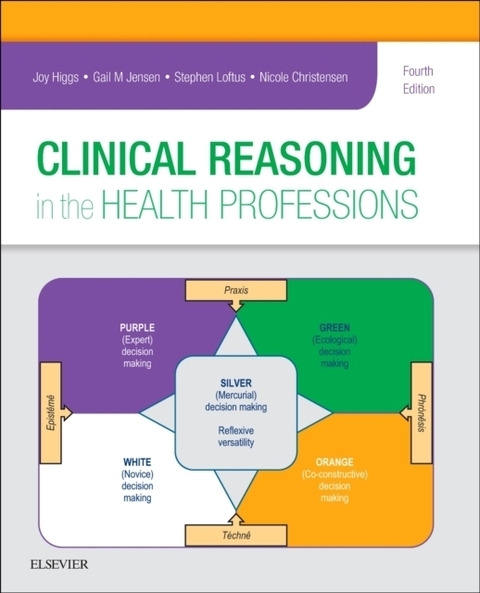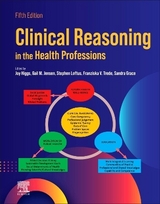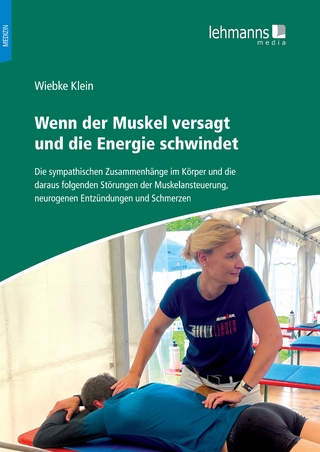
Clinical Reasoning in the Health Professions
Elsevier Health Sciences (Verlag)
978-0-7020-6224-7 (ISBN)
Key themes presented:
Clinical reasoning as a composite of encultured capabilities
Clinical reasoning embedded within situated practice including the wider socio-economic and political contexts, the practitioner's and the client's contexts, and shared goals such as promoting health communities
The importance of narratives, language and culture in clinical decision making
Changing reasoning practices linked to increasing autonomy of practitioners working without the requirement of medical referrals
Clinical reasoning as an increasingly team-based practice, including shared decision making with clients
The need for sound strategies and tools to facilitate the expanding collaborations in health care across disciplines and with clients and carers
Advanced education approaches promoting expansion and enhancement of reasoning strategies
The importance of building good practices for learning clinical reasoning into curricula and into students' own practice development approaches
Strengthening links between orthodox and complementary medicine reasoning practices
New to this edition:
- All chapters updated and 20 new chapters added
- Concrete examples, cases and vignettes were added to bring discussions to life for the reader
- Reflection points strategically placed to assist readers to extend their insights and build learning from their own practical experiences and theoretical knowledge
- Devices of particular value to reflective practitioners and educators.
This is a book for teachers and learners, practitioners, practice leaders, researchers and curriculum managers. Indeed, it is a valuable resource for educators seeking to ground their teaching practices in educational theory, sound knowledge of clinical reasoning and practice-based evidence, and researchers seeking to expand their research horizons.
Joy has worked for over 35 years as an educator, scholar, researcher and research supervisor at The University of New South Wales, The University of Sydney and Charles Sturt University. She has held appointments as visiting scholar and consultant to a number of Australian and international tertiary institutions. In 2004, Joy received a Member of the Order of Australia award for service to health science education through course development, academic and administrative contributions and research into teaching methods. She was awarded an Australian Teaching and Learning Council Fellowship in 2010. Joy is a member of the Australian Learning and Teaching Fellows Network. In 2015, Joy was appointed a Principal Fellow of the Higher Education Academy, UK. Professor Joy Higgs' key roles at CSU are promoting the advancement of professional practice and education through collaborations in research, scholarship, student supervision, education, organisational change and networking. Joy's research interests are linked to professional practice (the nature of practice across professions, practice wisdom, professionalism, the changing shape of professions in work and society), higher education (quality and innovations), professional education (pedagogies, socialisation, expectations of graduates), practice-based education (pedagogy, curriculum frameworks) and qualitative research strategies.
Dr. Jensen is Vice Provost for Learning and Assessment, Dean Emerita, and Professor of Physical Therapy at Creighton University. She is known nationally and internationally for scholarly contributions in expert practice, clinical reasoning, professional ethics, and interprofessional education. Dr. Jensen is author or coauthor of more than 90 publications in peer-reviewed journals and has coauthored 13 books, including the fourth edition of Clinical Reasoning in the Health Professions (Higgs, Jensen, Loftus, Christensen), Educating Physical Therapists, and in 2020, Clinical Reasoning and Decision Making in Physical Therapy. She led the research team that completed a National Study of Excellence and Innovation in Physical Therapist Education funded by the American Physical Therapy Association and several APTA components. She serves on a number of editorial boards and most recently became an associate editor for The Clinical Teacher. Dr. Jensen received her PhD in educational evaluation with a minor in sociology from Stanford University. She holds a master's degree in physical therapy from Stanford University and a bachelor's degree in education from the University of Minnesota.
Dr. Loftus joined Oakland University William Beaumont School of Medicine in November 2013 as associate professor of Medical Education. He is responsible for faculty development in medical education. He is also involved in a number of courses such as Medical Humanities and Embark research projects. A dental professional with more than 20 years in medical education, Dr. Loftus developed an internationally recognized inter-professional online graduate course in pain management at Sydney University. His research on clinical reasoning has appeared in several journals and books, such as the well-received book, "Clinical Reasoning in the Health Professions" (3rd ed). He has also supervised doctoral research students at Charles Sturt University in Australia, in topics such as clinical reasoning, higher education and clinician/patient relationships. Dr. Loftus works to ensure that students and faculty maximize the benefit of the educational experiences provided in the medical school through coming to a deeper understanding of what is involved in medical education and practice.
Section 1 Understanding clinical reasoning
Clinical reasoning: Challenges of interpretation and practice in the 21st century
Re-interpreting clinical reasoning: A model of encultured decision making practice capabilities
Multiple spaces of choice, engagement and influence in clinical decision making
Clinical reasoning and models of practice
The development of clinical reasoning expertise
Expertise and clinical reasoning
Section 2 The changing context of clinical reasoning and practice
The context of clinical reasoning across the health professions in the 21st century
Changing demographic and cultural dimensions of populations: Implications for healthcare and decision making
Clinical thinking, client expectations and patient-centred care
Next generation clinical practice guidelines
Action and narrative: Two dynamics of clinical reasoning
The language of clinical reasoning
Evidence-based practice and clinical reasoning: In tension, tandem or two sides of the same coin?
Methods in the study of clinical reasoning
Section 3 Collaborative and transdisciplinary reasoning
Collaborative decision making in liquid times
Ethical reasoning
Shared decision making in practice
Using decision aids to involve clients in clinical decision making
Clinical decision making, social justice and client empowerment
Clinical decision making across orthodox and complementary medicine fields
Section 4 Clinical reasoning and the professions
Clinical reasoning in medicine
Clinical reasoning in nursing
Clinical reasoning in physiotherapy
Clinical reasoning in dentistry
Clinical reasoning in occupational therapy
Clinical decision making in emergency medicine
Clinical decision making in paramedicine
Clinical decision making in optometry
Clinical reasoning in dietetics
Clinical reasoning in pharmacy
Section 5 Teaching clinical reasoning
Pedagogies for teaching and learning clinical reasoning
Teaching clinical reasoning in medical education courses
Teaching clinical reasoning in nursing education
Speech-language pathology students: Learning clinical reasoning
Clinical reasoning and biomedical knowledge: Implications for teaching
Cultivating a thinking surgeon, using a Clinical Thinking Pathway as a learning and assessment process: ten years on
Interprofessional programs to develop clinical reasoning
Assessing clinical reasoning
Section 6 Learning clinical reasoning+
Learning to communicate clinical reasoning
Developing clinical reasoning capability
Remediating learning and performance of clinical reasoning in medicine
Learning about factors influencing clinical decision making
Learning reasoning using simulation
Learning to use evidence to support decision making
Learning to research clinical reasoning
Learning clinical reasoning across cultural contexts
Peer learning to develop clinical reasoning abilities
| Erscheinungsdatum | 17.10.2018 |
|---|---|
| Verlagsort | London |
| Sprache | englisch |
| Maße | 191 x 235 mm |
| Gewicht | 1160 g |
| Themenwelt | Medizin / Pharmazie ► Medizinische Fachgebiete ► Sportmedizin |
| ISBN-10 | 0-7020-6224-3 / 0702062243 |
| ISBN-13 | 978-0-7020-6224-7 / 9780702062247 |
| Zustand | Neuware |
| Informationen gemäß Produktsicherheitsverordnung (GPSR) | |
| Haben Sie eine Frage zum Produkt? |
aus dem Bereich



